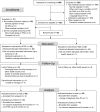Cognition and obstructive sleep apnea in Parkinson's disease: randomized controlled trial of positive airway pressure
- PMID: 39945727
- PMCID: PMC12246369
- DOI: 10.1093/sleep/zsaf038
Cognition and obstructive sleep apnea in Parkinson's disease: randomized controlled trial of positive airway pressure
Abstract
Study objectives: This randomized controlled trial assessed the effects of positive airway pressure (PAP) treatment of obstructive sleep apnea (OSA) on cognition in patients with Parkinson's disease (PD).
Methods: Individuals with PD with Montreal Cognitive Assessment (MoCA) ≤ 27 and OSA were randomized to PAP or nasal dilator strips (placebo) for 6 months. The primary outcome was the change in MoCA from baseline to 6 months compared by t-test between groups by intention to treat (ITT). Sensitivity and per protocol (PP) analyses were performed, adjusting for potential confounders. Secondary outcomes included patient-reported and motor outcomes. Exploratory outcomes comprised detailed neurocognitive tests.
Findings: We randomized 94 participants (31% female) with a mean age of 67.3 (standard deviation 10.5) years, body mass index of 28.1 (4.7) kg/m2, and MoCA of 22.7 (3.5). The change in MoCA in the PAP group (n = 48) was 0.60, 95% CI [-0.08, 1.29] and in the control group (n = 46) -0.39, 95% CI [-1.21, 0.43]; between-group difference 1.00, 95% CI [-0.06, 2.05] (ITT). Adjusted ITT analyses showed improved MoCA by 1.44, 95% CI [0.09, 2.79], in treated versus control groups. In PP analyses, the adjusted between-group difference was 1.43, 95% CI [0.054, 2.81] between PAP (n = 33) versus control (n = 41) groups. Nonmotor symptoms, depression and sleep quality scores, and performance on certain executive and psychomotor tasks improved with PAP. PP analyses also showed significant improvement in motor function in PAP compared to control groups.
Conclusions: Evaluation for OSA in PD patients with reduced cognition should be considered as OSA treatment may improve cognitive function, and possibly patient-reported and motor outcomes.
Clinical trial information: Registered as "Cognition and Obstructive Sleep Apnea in Parkinson's Disease, Effect of Positive Airway Pressure Therapy (COPE-PAP)" at ClinicalTrials.gov. ID: NCT02209363. https://clinicaltrials.gov/study/NCT02209363?term=kaminska&rank=4.
Keywords: CPAP; MDS-UPDRS; MoCA; Parkinson’s disease; cognitive function; neurocognitive assessment; obstructive sleep apnea; randomized controlled trial; sleep disorders.
© The Author(s) 2025. Published by Oxford University Press on behalf of Sleep Research Society.
Figures
References
-
- Lal C, Ayappa I, Ayas N, et al. The link between obstructive sleep apnea and neurocognitive impairment: an official American thoracic society workshop report. Annal Am Thoracic Soc. 2022;19(8):1245–1256. doi: https://doi.org/ 10.1513/AnnalsATS.202205-380ST - DOI - PMC - PubMed
-
- Gosselin N, Baril AA, Osorio RS, Kaminska M, Carrier J.. Obstructive sleep apnea and the risk of cognitive decline in older adults. Am J Respir Crit Care Med. 2019;199(2):142–148. doi: https://doi.org/ 10.1164/rccm.201801-0204PP - DOI - PMC - PubMed
-
- Dorsey ER, Sherer T, Okun MS, Bloem BR.. The emerging evidence of the parkinson pandemic. J Parkinsons Dis. 2018;8(s1):S3–S8. doi: https://doi.org/ 10.3233/JPD-181474 - DOI - PMC - PubMed
-
- Kadastik-Eerme L, Rosenthal M, Paju T, Muldmaa M, Taba P.. Health-related quality of life in Parkinson’s disease: a cross-sectional study focusing on non-motor symptoms. Health Qual Life Outcomes. 2015;13:83. doi: https://doi.org/ 10.1186/s12955-015-0281-x - DOI - PMC - PubMed
-
- Marras C, Lang A.. Invited article: changing concepts in Parkinson disease: moving beyond the decade of the brain. Neurology. 2008;70(21):1996–2003. doi: https://doi.org/ 10.1212/01.wnl.0000312515.52545.51 - DOI - PubMed
Publication types
MeSH terms
Associated data
Grants and funding
LinkOut - more resources
Full Text Sources
Medical
Research Materials
Miscellaneous




